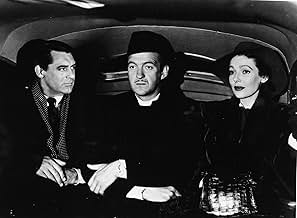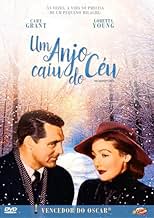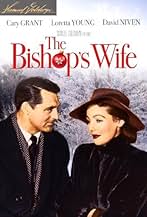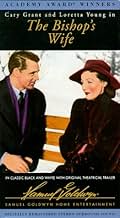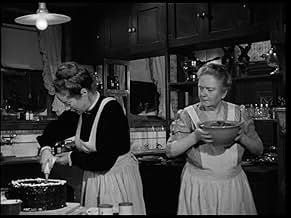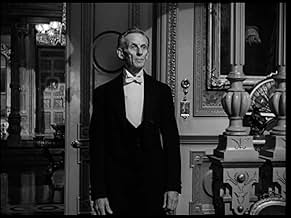Un ange sous forme humaine entre dans la vie d'un évêque pour l'aider à construire une nouvelle cathédrale et à réparer son mariage.Un ange sous forme humaine entre dans la vie d'un évêque pour l'aider à construire une nouvelle cathédrale et à réparer son mariage.Un ange sous forme humaine entre dans la vie d'un évêque pour l'aider à construire une nouvelle cathédrale et à réparer son mariage.
- Réalisation
- Scénario
- Casting principal
- Récompensé par 1 Oscar
- 4 victoires et 4 nominations au total
- Mrs. Ward
- (as Ann O'Neal)
- Defense Captain
- (as Bobby Anderson)
Avis à la une
But like "Groundhog Day", the surface simplicity is misleading, as this is an allegorical tale about the importance of getting outside ourselves and taking steps to escape the ruts of our day-to-day lives; i.e. finding a better way of living. Dudley works a few minor heavenly miracles but his real power is as a cheerleader and personal guide. No need to be an angel to exercise this kind of positive influence on others.
Dudley the angel comes to earth to help a Bishop (David Niven) juggle his professional and marital commitments, the conflict being that his priorities have changed since his promotion from the priest of a struggling parish. Only the bishop knows that Dudley is other than human and it takes most of the film before he is totally convinced. Meanwhile his wife and many others in the town are swept up by Dudley's charms. The Bishop is pre-occupied with securing funding for constructing a new cathedral but begins to catch on that Dudley and his wife are getting along so well that the unimaginable could occur-the angel stealing his wife.
If only one word could be used to describe "The Bishop's Wife" it would be subtle. The special effects are minimalist but effective, the careful framing and lighting of Gregg Toland's ("Citizen Kane") black and white cinematography, the tentative steps title character Julia (Loretta Young) takes as she starts to experience happiness again, and the slow realization by Bishop Henry of how far he has drifted from what matters the most.
The unity and subtlety is best illustrated in the scene of Henry walking up the sidewalk towards the Professor's (Monty Wooley) apartment. Although a few minutes from the end, this is actually the film's climax as Henry is finally confronting himself. As he walks forward the dark screen begins to get brighter; in step with his progress toward spiritual change and discovery is the end of his physical journey. He moves symbolically (and literally) toward the light.
Rounding out the strong cast are James Gleason (Max Corkle in "Here Comes Mr. Jordan") Elsa Lanchester, and Gladys Cooper. Henry and Julia's young daughter is played by Karolyn Grimes (Zuzu in "It's a Wonderful Life").
A nice thing is that while the film's "little" miracles are done on screen they are interwoven into the fabric of the story instead of dominating a scene. This casualness fits the tone of the film as does the occasional satirical line. The most memorable conversation is Cooper's demand (she is pledging money for the new cathedral) that the George figure in the proposed "St. George and the Dragon" stained glass window be made to resemble her late husband. Then Niven (deadpan) asks her whom she wants the dragon to resemble.
There will be a few who do not enjoy this film but I recommend it to anyone who wants a nice holiday film, or who is interested in a relatively deep allegorical tale of one's capacity to be a positive influence on others, or who just wants to see a truly awesome example of technical film-making.
Then again, what do I know? I'm only a child.
Cary Grant plays an angel that comes to assist the extremely controlling and obsessed Bishop, played by David Niven. While Niven prayed for divine help, he struggled throughout the film with accepting the help on anything but his own terms. He soon learns of Grant's mission, but others are unaware of his Heavenly origins. Grant plays his angelic role in a very deliberately paced and casual manner--almost like combining TV's Mister Rogers with the usual Grant persona! In addition to these two wonderful actors, the film also features Loretta Young, Monty Woolley, James Gleason, Elsa Lanchester and Gladys Cooper. All did a great job of providing color and support in the film.
Perhaps the biggest star of this film, though, were the sets, cinematography and direction. They created a really nostalgic sense to the film that seemed almost better than real life. The snow, the frozen pond and all the other aspects of the film just set the perfect mood. About the only negative at all (and it's a small one) is the skating sequence. While it was nice to see Grant and Young really ice skating in the beginning, using doubles for them as well as James Gleason wasn't very seamless. Having these doubles skating with darkened faces just seemed pretty cheesy but forgivable.
All-in-all, this is a nice fantasy film that should be enjoyed by most anyone except the most cynical viewers.
THE BISHOP'S WIFE is a sweet little romantic dramedy, perfect for a Christmas night curled up before the TV set. You have to give it credit for packing in a lot more story and real, human characters than you'd expect--it's not stock Christmas heart-tugging schmokum (did I just make up a word?), but a story that's quite genuinely intelligent and real. It's not perfect (what is?), but its presentation of the characters, especially Dudley and Henry, ring true. You can believe that Henry, underneath his bitterness and myopia, really loves his wife. He's just... forgotten his direction in life, is all. Niven does an excellent job with the character, keeping him just this side of prim but making him sympathetic especially when he asks Dudley to put up his fists for Julia.
My favourite secondary characters are Sylvester, played impeccably by Gleason, and the slightly dotty Professor Wutheridge (Monty Woolley). They're actually real *people*. Actually, they even fare better than Julia herself, whom I didn't particularly warm to. I wasn't annoyed by her, but nor did I feel that it was very likely she could get a reverend and an angel to almost come to blows over her. It's a shame that Loretta Young spent most of the film looking pensive, and even in her character's moments of joy--say the ice-skating scene--she simply fails to leap off the screen and run away with the audience's hearts.
Cary Grant has no such problem, however. From the moment he strolls onscreen as Dudley--the guardian angel every girl wished she could have--he has everyone's attention. He makes Dudley just a little bit roguish, a little bit dark. You couldn't really take Grant seriously if he's all decked out in an angel's costume, halo and harp and all, but you *can* imagine him as a sort of very human kind of angel. Which is exactly what Dudley is. It's mostly the smaller moments Grant sneaks into the film and his own performance that make THE BISHOP'S WIFE compelling viewing, and if you came to this film as a Grant fan, you certainly won't leave it disappointed.
All in all, the final film is well-drawn-together, cleverly written and directed, and benefiting from its two powerhouse male leads... Niven cleverly underplaying his part, and Grant suffusing Dudley with the charm and deep, hidden vulnerability he can suggest in all his characters without so much as faking a pained expression. It's definitely a great way to spend a Christmas night, and perhaps any other night. 8/10.
Le saviez-vous
- AnecdotesOriginally Cary Grant played the bishop and David Niven the angel. When original director William A. Seiter left the film, Henry Koster replaced him and viewed what had been shot so far. He realized that the two were in the wrong roles. It took some convincing because Grant wanted the title role of the Bishop. He eventually accepted the change and his role as the angel was one of the most widely praised of his career.
- GaffesObvious stunt double when Dudley shows Julia how he can spin on the ice; he appears shorter and seems to be wearing dark-rimmed glasses.
- Citations
[last lines]
Henry Brougham: Tonight I want to tell you the story of an empty stocking. Once upon a midnight clear, there was a child's cry. A blazing star hung over a stable and wise men came with birthday gifts. We haven't forgotten that night down the centuries; we celebrate it with stars on Christmas trees, the sound of bells and with gifts. But especially with gifts. You give me a book; I give you a tie. Aunt Martha has always wanted an orange squeezer and Uncle Henry could do with a new pipe. We forget nobody, adult or child. All the stockings are filled... all that is, except one. And we have even forgotten to hang it up. The stocking for the child born in a manger. It's his birthday we are celebrating. Don't ever let us forget that. Let us ask ourselves what he would wish for most... and then let each put in his share. Loving kindness, warm hearts and the stretched out hand of tolerance. All the shining gifts that make peace on earth.
- Versions alternativesAlso available in a computer colorized version.
- ConnexionsFeatured in The Soundman (1950)
Meilleurs choix
- How long is The Bishop's Wife?Alimenté par Alexa
- Is "The Bishop's Wife" based on a book?
- Whose prayer does Dudley answer -- the bishop's or the bishop's wife's?
- To what denomination does the bishop belong?
Détails
- Date de sortie
- Pays d’origine
- Langues
- Aussi connu sous le nom de
- Un enviado del cielo
- Lieux de tournage
- Loring Park, Minneapolis, Minnesota, États-Unis(snowball fight scene)
- Société de production
- Voir plus de crédits d'entreprise sur IMDbPro
Box-office
- Montant brut mondial
- 44 $US
- Durée1 heure 49 minutes
- Couleur
- Rapport de forme
- 1.37 : 1
Contribuer à cette page



